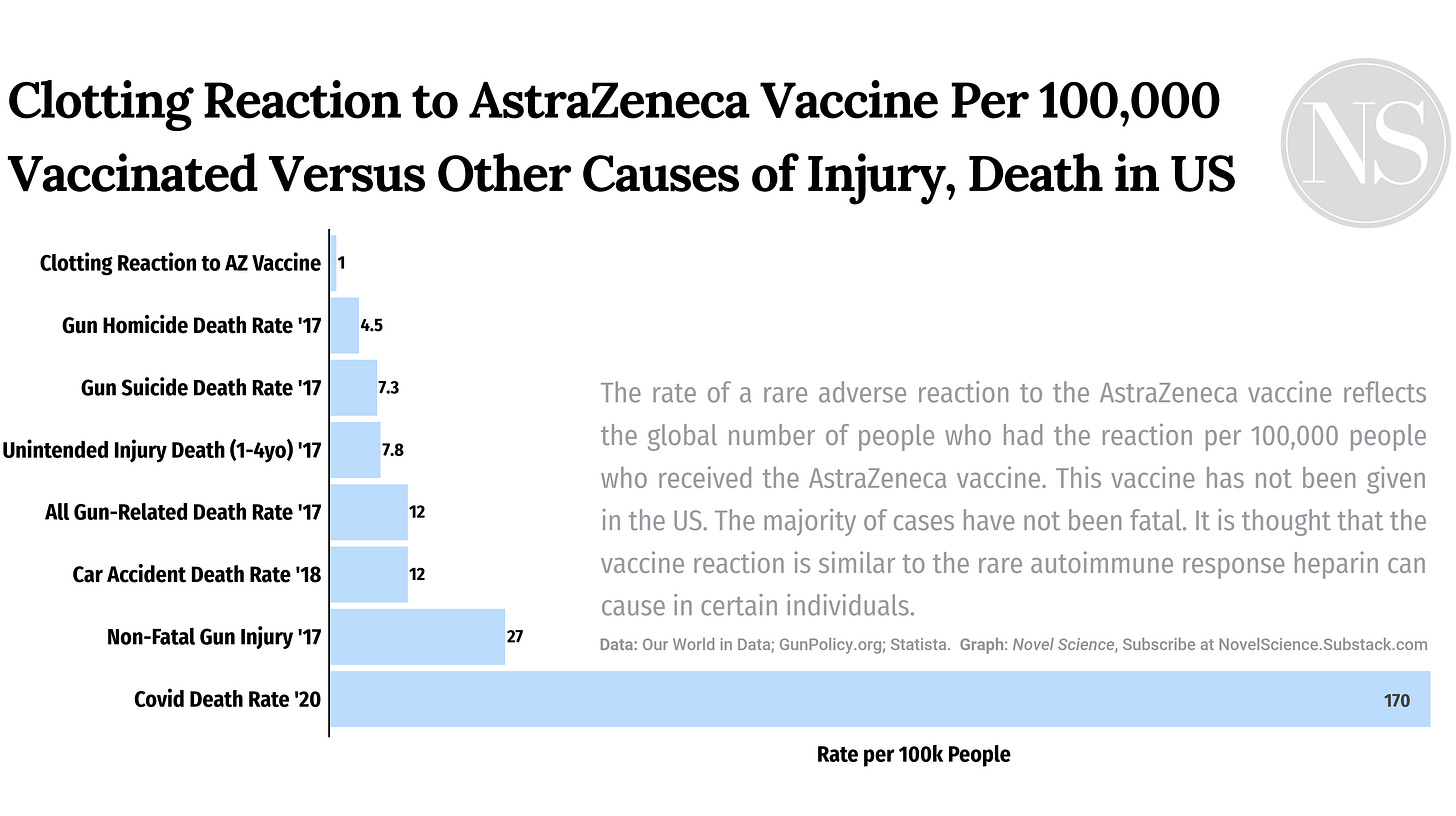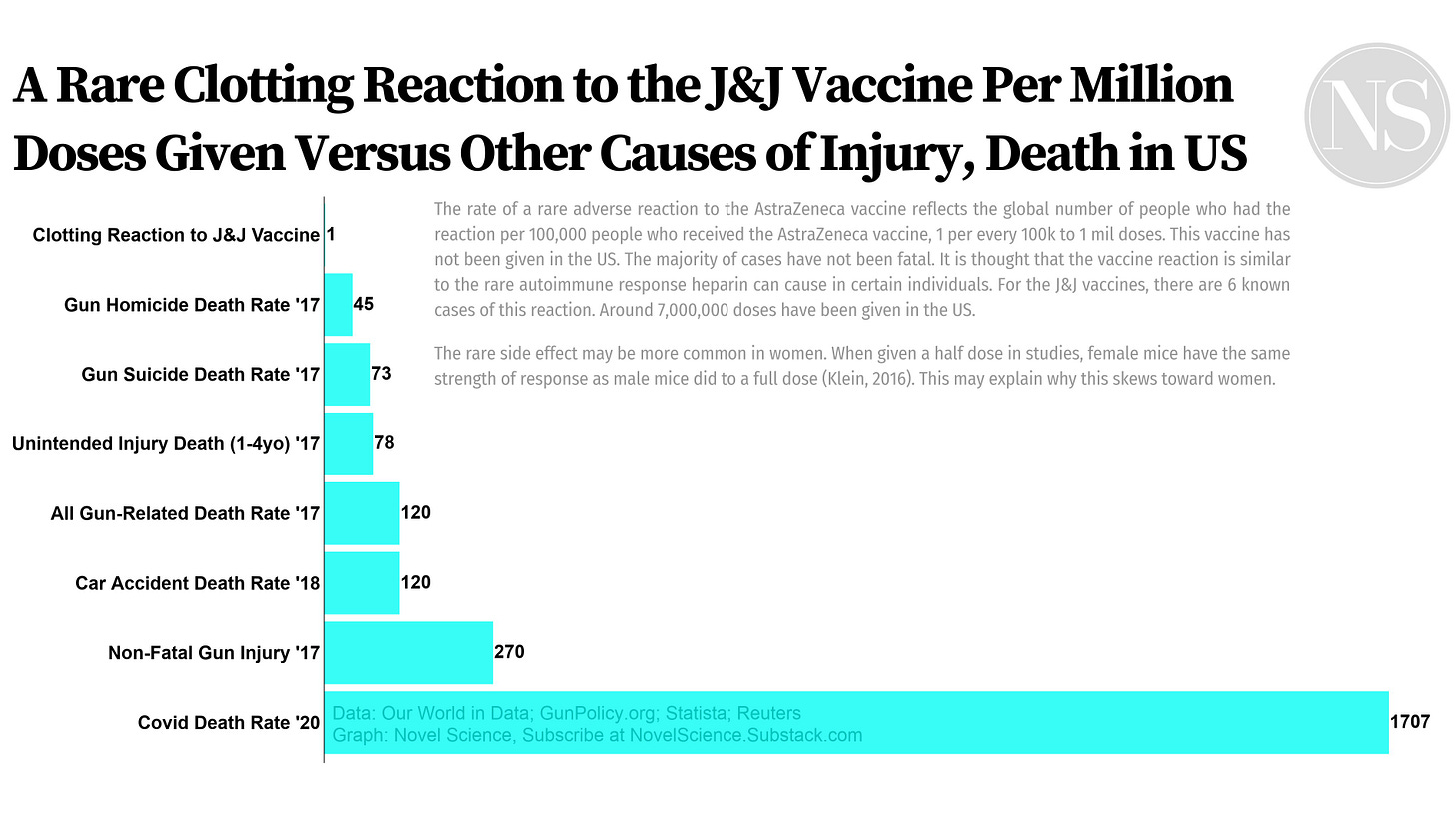What You Should Know About the J&J Vaccine Besides What Scary Headlines Say
A rare reaction to Johnson & Johnson vaccine affected 6 people in the 7 million doses given in the US. Here's what you should know.
A rare reaction to the Johnson & Johnson vaccine affected 6 people in the 7 million doses given in the US. Here's what you should know. The rare side effect may be more common in women. When given a half dose in studies, female mice had the same strength of response as male mice did to a full dose (Klein, 2016). This may explain why this skews toward women; it may not.
In the case of the AstraZeneca vaccine, 86 cases occurred out of approximately 25 million people who have received one or more doses of the vaccine. Americans have not and will likely not have access to the AstraZeneca vaccine, so it’s less of a concern in the US. Still, understanding what is happening may be helpful for those who are nervous about the vaccines.
In Europe, countries are still struggling to determine the best approach to using the vaccine, although the benefits do outweigh the risks.
The cause of the rare clotting reaction appears similar to the rare autoimmune response to heparin where a patient's immune system activates platelets (the element of blood that clots off bleeding).
The EMA’s (Europe’s FDA) Pharmacovigilance Risk Assessment Committee (PRAC) looked at the 86 total cases of thrombosis following vaccination, including 18 deaths, and determined that blood clotting should be listed as a “very rare” adverse event for the AstraZeneca-Oxford vaccine.
—estimates for the rate for this rare but serious adverse event range from 1 case per 100,000 people to 1 case per 1,000,000.
Notably, 86 cases occurred out of approximately 25 million people who have received one or more doses of the vaccine.
The clotting events occur more frequently in women under the age of 60 and typically occur within 2 weeks of vaccination, but additional risk factors have not yet been characterized.
The EMA explicitly noted that the “overall benefits of the vaccine in preventing COVID-19 outweigh the risks of side effects.”
If we assume the highest estimated rate for this clotting response, let’s put it in perspective.
Other things to think about right now:
1) Take a deep breath and remind yourself that we struggle with understand risk with large numbers and fear doesn't help that. In a crisis, our information processing undergoes four main changes.
We believe the first message
We simplify the message, leaning toward black and white thinking
We rely on our pre-existing beliefs
We look for confirmation of what we’re hearing from trusted sources, which is not always synonymous with reliable sources. \
Consider these lifetime odds:
Lifetime odds of dying in a car crash: 1 in 107
Lifetime odds of being struck by lightning: 1 in 3,000.
Lifetime odds of a lethal dog attack: 1 in 86,781
Odds of developing lethal clots from J&J vaccine: ~1 in 6,800,000.
2) We suffer from omission bias, which is where we more readily accept bad outcomes from our inaction than those from our action, even when inaction causes more harm.
“Imagine you are standing beside some tram tracks. In the distance, you spot a runaway trolley hurtling down the tracks towards five workers who cannot hear it coming. Even if they do spot it, they won’t be able to move out of the way in time.
As this disaster looms, you glance down and see a lever connected to the tracks. You realize that if you pull the lever, the tram will be diverted down a second set of tracks away from the five unsuspecting workers. However, down this side track is one lone worker, just as oblivious as his colleagues.
So, would you pull the lever, leading to one death but saving five?”
3) Our adversaries have been weaponizing stories to skew our risk perception for months. US media has in some cases helped with that. We need to keep in perspective the risk from Covid, which again disinformants are downplaying.
4) Parties who benefit from our fear may try to use this influence us. We need to be aware of that threat. 6 cases (6 deaths) per 7 million doses, is far better than 1707 Covid deaths per million people in the US. That number only goes up from there as not everyone has been infected.
#COVID19 #vaccine #CovidVaccine #openscience #scicomm #politics #epitwitter #medtwitter #vaccinehesitancy #pseudoscience #disinformation
Sharable graphs in other sizes:








